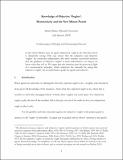| dc.contributor.author | Spencer, Jack | |
| dc.date.accessioned | 2021-03-17T13:40:28Z | |
| dc.date.available | 2021-03-17T13:40:28Z | |
| dc.date.issued | 2020-05 | |
| dc.date.submitted | 2020-01 | |
| dc.identifier.issn | 0031-8205 | |
| dc.identifier.uri | https://hdl.handle.net/1721.1/130151 | |
| dc.description.abstract | In the classic Miners case, an agent subjectively ought to do what they know is objectively wrong. This case shows that the subjective and objective ‘oughts’ are somewhat independent. But there remains a powerful intuition that the guidance of objective ‘oughts’ is more authoritative—so long as we know what they tell us. We argue that this intuition must be given up in light of a monotonicity principle, which undercuts the rationale for saying that objective ‘oughts’ are an authoritative guide for agents and advisors. | en_US |
| dc.language.iso | en | |
| dc.publisher | Wiley | en_US |
| dc.relation.isversionof | 10.1111/phpr.12702 | en_US |
| dc.rights | Creative Commons Attribution-Noncommercial-Share Alike | en_US |
| dc.rights.uri | http://creativecommons.org/licenses/by-nc-sa/4.0/ | en_US |
| dc.source | Other repository | en_US |
| dc.title | Knowledge of Objective ‘Oughts’: Monotonicity and the New Miners Puzzle | en_US |
| dc.type | Article | en_US |
| dc.identifier.citation | Muñoz, Daniel and Jack Spencer. “Knowledge of Objective ‘Oughts’: Monotonicity and the New Miners Puzzle.” Philosophy and Phenomenological Research (May 2020) © 2020 The Author(s) | en_US |
| dc.contributor.department | Massachusetts Institute of Technology. Department of Linguistics and Philosophy | en_US |
| dc.relation.journal | Philosophy and Phenomenological Research | en_US |
| dc.eprint.version | Author's final manuscript | en_US |
| dc.type.uri | http://purl.org/eprint/type/JournalArticle | en_US |
| eprint.status | http://purl.org/eprint/status/PeerReviewed | en_US |
| dc.date.updated | 2021-03-12T19:03:08Z | |
| dspace.orderedauthors | Muñoz, D; Spencer, J | en_US |
| dspace.date.submission | 2021-03-12T19:03:17Z | |
| mit.license | OPEN_ACCESS_POLICY | |
| mit.metadata.status | Complete | |
